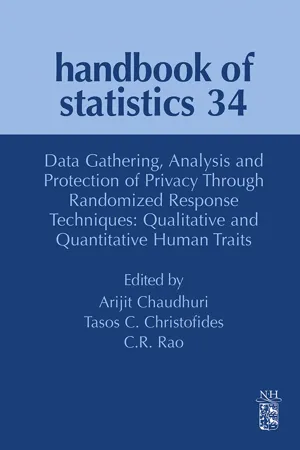
- 544 pages
- English
- ePUB (mobile friendly)
- Available on iOS & Android
eBook - ePub
About this book
Data Gathering, Analysis and Protection of Privacy through Randomized Response Techniques: Qualitative and Quantitative Human Traits tackles how to gather and analyze data relating to stigmatizing human traits. S.L. Warner invented RRT and published it in JASA, 1965. In the 50 years since, the subject has grown tremendously, with continued growth. This book comprehensively consolidates the literature to commemorate the inception of RR.- Brings together all relevant aspects of randomized response and indirect questioning- Tackles how to gather and analyze data relating to stigmatizing human traits- Gives an encyclopedic coverage of the topic- Covers recent developments and extrapolates to future trends
Frequently asked questions
Yes, you can cancel anytime from the Subscription tab in your account settings on the Perlego website. Your subscription will stay active until the end of your current billing period. Learn how to cancel your subscription.
No, books cannot be downloaded as external files, such as PDFs, for use outside of Perlego. However, you can download books within the Perlego app for offline reading on mobile or tablet. Learn more here.
Perlego offers two plans: Essential and Complete
- Essential is ideal for learners and professionals who enjoy exploring a wide range of subjects. Access the Essential Library with 800,000+ trusted titles and best-sellers across business, personal growth, and the humanities. Includes unlimited reading time and Standard Read Aloud voice.
- Complete: Perfect for advanced learners and researchers needing full, unrestricted access. Unlock 1.4M+ books across hundreds of subjects, including academic and specialized titles. The Complete Plan also includes advanced features like Premium Read Aloud and Research Assistant.
We are an online textbook subscription service, where you can get access to an entire online library for less than the price of a single book per month. With over 1 million books across 1000+ topics, we’ve got you covered! Learn more here.
Look out for the read-aloud symbol on your next book to see if you can listen to it. The read-aloud tool reads text aloud for you, highlighting the text as it is being read. You can pause it, speed it up and slow it down. Learn more here.
Yes! You can use the Perlego app on both iOS or Android devices to read anytime, anywhere — even offline. Perfect for commutes or when you’re on the go.
Please note we cannot support devices running on iOS 13 and Android 7 or earlier. Learn more about using the app.
Please note we cannot support devices running on iOS 13 and Android 7 or earlier. Learn more about using the app.
Yes, you can access Data Gathering, Analysis and Protection of Privacy Through Randomized Response Techniques: Qualitative and Quantitative Human Traits by in PDF and/or ePUB format, as well as other popular books in Mathematics & Probability & Statistics. We have over one million books available in our catalogue for you to explore.
Information
Table of contents
- Cover image
- Title page
- Table of Contents
- Copyright
- Contributors
- Preface
- Chapter 1: Review of Certain Recent Advances in Randomized Response Techniques
- Chapter 2: The Background and Genesis of Randomized Response Techniques
- Chapter 3: How Randomized Response Techniques Need not Be Confined to Simple Random Sampling but Liberally Applicable to General Sampling Schemes
- Chapter 4: The Classical Randomized Response Techniques: Reading Warner (1965) and Greenberg et al. (1969) 50 Years Later
- Chapter 5: On the Estimation of Correlation Coefficient Using Scrambled Responses
- Chapter 6: Admissible and Optimal Estimation in Finite Population Sampling Under Randomized Response Models
- Chapter 7: A Mixture of True and Randomized Responses in the Estimation of the Number of People Having a Certain Attribute
- Chapter 8: Estimation of Complex Population Parameters Under the Randomized Response Theory
- Chapter 9: An Efficient Randomized Response Model Using Two Decks of Cards Under Simple and Stratified Random Sampling
- Chapter 10: Software for Randomized Response Techniques
- Chapter 11: Poststratification Based on the Choice of Use of a Quantitative Randomization Device
- Chapter 12: Variance Estimation in Randomized Response Surveys
- Chapter 13: Behavior of Some Scrambled Randomized Response Models Under Simple Random Sampling, Ranked Set Sampling and Rao–Hartley–Cochran Designs
- Chapter 14: Estimation of a Finite Population Variance Under Linear Models for Randomized Response Designs
- Chapter 15: Randomized Response and New Thoughts on Politz–Simmons Technique
- Chapter 16: Optional Randomized Response: A Critical Review
- Chapter 17: A Concise Theory of Randomized Response Techniques for Privacy and Confidentiality Protection
- Chapter 18: A Review of Regression Procedures for Randomized Response Data, Including Univariate and Multivariate Logistic Regression, the Proportional Odds Model and Item Response Model, and Self-Protective Responses
- Chapter 19: Eliciting Information on Sensitive Features: Block Total Response Technique and Related Inference
- Chapter 20: Optional Randomized Response Revisited
- Chapter 21: Measures of Respondent Privacy in Randomized Response Surveys
- Chapter 22: Cramer–Rao Lower Bounds of Variance for Estimating Two Proportions and Their Overlap by Using Two Decks of Cards
- Chapter 23: Estimating a Finite Population Proportion Bearing a Sensitive Attribute from a Single Probability Sample by Item Count Technique
- Chapter 24: Surveying a Varying Probability Adaptive Sample to Estimate Cost of Hospital Treatments of Sensitive Diseases by RR Data Gathering
- Chapter 25: Estimation of Means of Two Rare Sensitive Characteristics: Cramer–Rao Lower Bound of Variances
- Chapter 26: Estimating Sensitive Population Proportion by Generating Randomized Response Following Direct and Inverse Hypergeometric Distribution
- Chapter 27: Incredibly Efficient Use of a Negative Hypergeometric Distribution in Randomized Response Techniques
- Chapter 28: Comparison of Different Imputing Methods for Scrambled Responses
- Chapter 29: On an Indirect Response Model
- Index